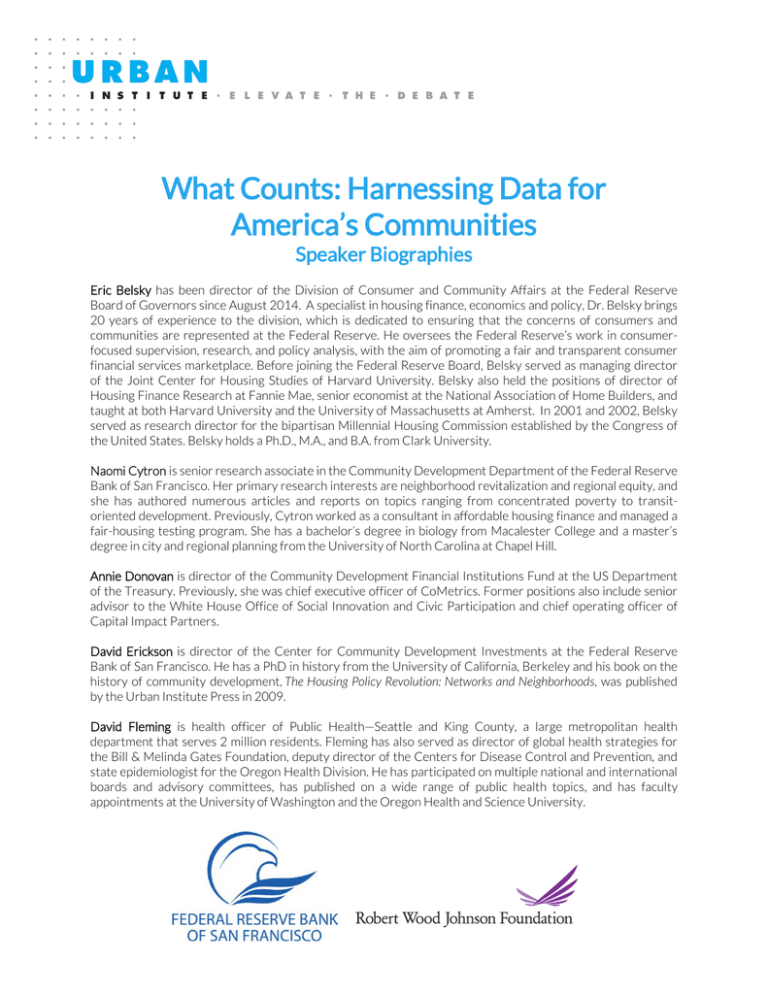What Counts: Harnessing Data for America’s Communities Speaker Biographies
advertisement

What Counts: Harnessing Data for America’s Communities Speaker Biographies Eric Belsky has been director of the Division of Consumer and Community Affairs at the Federal Reserve Board of Governors since August 2014. A specialist in housing finance, economics and policy, Dr. Belsky brings 20 years of experience to the division, which is dedicated to ensuring that the concerns of consumers and communities are represented at the Federal Reserve. He oversees the Federal Reserve’s work in consumerfocused supervision, research, and policy analysis, with the aim of promoting a fair and transparent consumer financial services marketplace. Before joining the Federal Reserve Board, Belsky served as managing director of the Joint Center for Housing Studies of Harvard University. Belsky also held the positions of director of Housing Finance Research at Fannie Mae, senior economist at the National Association of Home Builders, and taught at both Harvard University and the University of Massachusetts at Amherst. In 2001 and 2002, Belsky served as research director for the bipartisan Millennial Housing Commission established by the Congress of the United States. Belsky holds a Ph.D., M.A., and B.A. from Clark University. Naomi Cytron is senior research associate in the Community Development Department of the Federal Reserve Bank of San Francisco. Her primary research interests are neighborhood revitalization and regional equity, and she has authored numerous articles and reports on topics ranging from concentrated poverty to transitoriented development. Previously, Cytron worked as a consultant in affordable housing finance and managed a fair-housing testing program. She has a bachelor’s degree in biology from Macalester College and a master’s degree in city and regional planning from the University of North Carolina at Chapel Hill. Annie Donovan is director of the Community Development Financial Institutions Fund at the US Department of the Treasury. Previously, she was chief executive officer of CoMetrics. Former positions also include senior advisor to the White House Office of Social Innovation and Civic Participation and chief operating officer of Capital Impact Partners. David Erickson is director of the Center for Community Development Investments at the Federal Reserve Bank of San Francisco. He has a PhD in history from the University of California, Berkeley and his book on the history of community development, The Housing Policy Revolution: Networks and Neighborhoods, was published by the Urban Institute Press in 2009. David Fleming is health officer of Public Health—Seattle and King County, a large metropolitan health department that serves 2 million residents. Fleming has also served as director of global health strategies for the Bill & Melinda Gates Foundation, deputy director of the Centers for Disease Control and Prevention, and state epidemiologist for the Oregon Health Division. He has participated on multiple national and international boards and advisory committees, has published on a wide range of public health topics, and has faculty appointments at the University of Washington and the Oregon Health and Science University. Amias Gerety serves as counselor for financial institutions at the US Department of the Treasury. In this role, Gerety is responsible for developing and coordinating the Treasury Department’s policies on issues affecting financial institutions and for overseeing Treasury programs, including the Community Development Financial Institutions Fund, the State Small Business Credit Initiative, and the Small Business Lending Fund. He previously served as deputy assistant secretary for the Financial Stability Oversight Council and as senior advisor to the assistant secretary for financial institutions. Maggie Grieve is vice president for Success Measures at NeighborWorks America, where she directs a social enterprise offering evaluation consulting, technical assistance, and technology services to national and community-based nonprofit organizations and funders. She previously served as director of research and evaluation at McAuley Institute, where she codirected the initial development of Success Measures as a shared measures approach to outcome-focused evaluation and managed the development of the Success Measures Data System, a web-based tool for data collection and evaluation support. Grieve holds a BA in American Studies from the University of Minnesota and studied Urban Planning at the Graduate School of Fine Arts, University of Pennsylvania. Alaina Harkness is program officer for the John D. and Catherine T. MacArthur Foundation. Her portfolio focuses on improving conditions in cities and strengthening the field of community development. She has a special interest in information technologies and their relationship to cities and democracy. Harkness is a fellow of Leadership Greater Chicago and serves on the boards of Chicago Women in Philanthropy, Funders’ Network for Smart Growth and Livable Communities, and the Harris School’s Alumni Advisory Council. She holds a bachelor’s degree from the University of Rochester and dual master’s degrees from the University of Chicago. Bill Kelly was president and cofounder of Stewards of Affordable Housing for the Future (SAHF) and is now its strategic adviser. Before SAHF’s launch, he was a partner in the law firm of Latham & Watkins and earlier served as law clerk to US Court of Appeals Judge Frank M. Coffin and US Supreme Court Justice Lewis F. Powell Jr. Kelly was also executive assistant to the secretary of the Department of Housing and Urban Development. He is a director of Ashoka Innovators for the Public, the International Senior Lawyers Project, and the Governance Institute. G. Thomas Kingsley is a senior fellow at the Urban Institute. His research specializes in housing, urban policy, and governance issues. He served for more than a decade as the director of the Institute’s Center for Public Finance and Housing. He has also directed the National Neighborhood Indicators Partnership—an initiative to further the development of advanced data systems for policy analysis and community building in U.S. cities. In recent years, his personal research has focused on neighborhood impacts of the foreclosure crisis, trends in concentrated poverty, and lessons from the HOPE VI program. He previously served as director of the Rand Corporation’s Housing and Urban Policy Program, and as Assistant Administrator of the New York City Housing and Development Administration. He has also taught on the faculties of the graduate urban planning programs at the University of California, Berkeley, and the University of Southern California. Kathryn Pettit is senior research associate in the Metropolitan Housing and Communities Policy Center at the Urban Institute, where her research focuses on measuring and understanding neighborhood change. She directs the National Neighborhood Indicators Partnership, a network of local organizations that collect, organize, and use neighborhood data to inform local advocacy and decision making. Pettit is a recognized expert on small-area data sources and the use of neighborhood data in research and practice. She has conducted research on a wide range of topics, including neighborhood redevelopment and federally assisted housing, and she recently coauthored the book Strengthening Communities with Neighborhood Data. Victor Rubin is vice president for research at PolicyLink, a national research and action institute advancing social and economic equity. He has been an urban planning researcher, teacher, and consultant for more than 30 years. He has recently led consultations on equitable economic growth strategies in several cities and wrote, with Sarah Treuhaft, “Economic Inclusion: Advancing an Equity-Driven Growth Model” for the Big Ideas for Jobs Project. Rubin joined PolicyLink in 2000 after serving as director of the US Department of Housing and Urban Development’s Office of University Partnerships. Donald Schwarz is a director at the Robert Wood Johnson Foundation, helping to lead the Foundation’s efforts to catalyze demand for healthy places and practices—key to RWJF’s vision of building a national Culture of Health. He joined RWJF after serving as deputy mayor for health and opportunity and health commissioner for the City of Philadelphia. In his role as deputy mayor, he oversaw the Department of Human Services, the Department of Behavioral Health and Intellectual Disability Services, and the Office of Supportive Housing. Before entering government service, Schwarz was Mary D. Ames Professor of Pediatrics at the University of Pennsylvania schools of medicine and nursing at The Children’s Hospital of Philadelphia and vice chairman of the Department of Pediatrics at the University of Pennsylvania School of Medicine. Sarah Rosen Wartell became the third president of the Urban Institute in February 2012. A public policy executive and housing markets expert, Wartell was President Bill Clinton's deputy assistant for economic policy and the deputy director of his National Economic Council. At the Department of Housing and Urban Development from 1993 to 1998, she advised the federal housing commissioner on housing finance, mortgage markets, and consumer protection. In 2012, she was named a “Woman of Influence” by HousingWire. Wartell cofounded the Center for American Progress, serving as its first chief operating officer and general counsel. Later, as executive vice president, Wartell oversaw its policy teams and fellows. Her work focused on the economy and housing markets, and she directed the Mortgage Finance Working Group and "Doing What Works" government performance program. Wartell practiced law with the Washington, DC, firm of Arnold & Porter and was a consultant to the bipartisan Millennial Housing Commission. Wartell has an AB degree with honors in urban affairs from Princeton University's Woodrow Wilson School of Public and International Affairs and holds a JD degree from Yale Law School.

